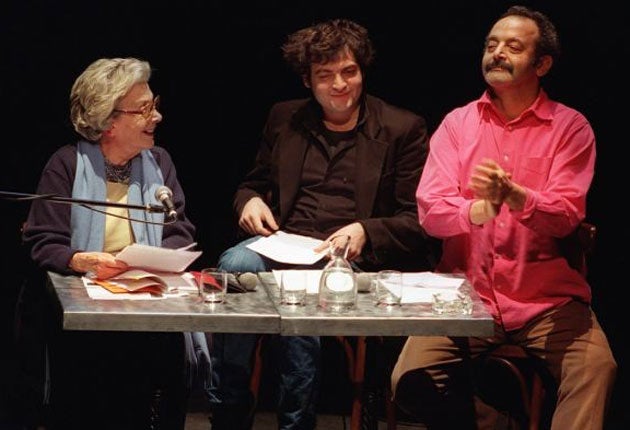Andree Chedid: Award-winning writer whose sparse language grappled with the human condition

Your support helps us to tell the story
From reproductive rights to climate change to Big Tech, The Independent is on the ground when the story is developing. Whether it's investigating the financials of Elon Musk's pro-Trump PAC or producing our latest documentary, 'The A Word', which shines a light on the American women fighting for reproductive rights, we know how important it is to parse out the facts from the messaging.
At such a critical moment in US history, we need reporters on the ground. Your donation allows us to keep sending journalists to speak to both sides of the story.
The Independent is trusted by Americans across the entire political spectrum. And unlike many other quality news outlets, we choose not to lock Americans out of our reporting and analysis with paywalls. We believe quality journalism should be available to everyone, paid for by those who can afford it.
Your support makes all the difference.Andrée Chedid was a prolific and multicultural writer who produced more than 40 volumes of poetry, novels and plays during her lifetime. Her work is characterised by her wish to "open our eyes to the suffering, misfortune and cruelty of the world; but also to the light, to the beauty, to everything which helps us to succeed, live better and invest in the future."
She was born in Cairo in 1920 to a Lebanese Maronite Christian family and started learning French and English at primary school. She left Egypt at the age of 14 to complete her schooling in Paris. After returning to Cairo, in 1942 she obtained a degree in journalism at the city's American University and married Louis Chedid. A year later her first volume of poetry, On the Trails of my Fancy, was published in Cairo in English, under the pseudonym "A. Lake".
In 1946 the couple moved to Paris, where her husband took up a postat the Institut Pasteur. Her firstpoetry collection in French, Textes pour une figure (Texts for a face), was published three years later, with encouragement from the one-time surrealist poet, René Char.
Writing was a process that she likened to sculpture and at which she preferred to work at night: "I sculpt in the dark because we have so much darkness within us that I need the sun of the morning in order to get to the end of it". The language of her poetry is sparse, dealing with the ever-present human condition and conveying images and emotions with an absolute minimum of words. For example, in Visage à la Fenêtre (A Face in the Window, 1983) a cycle of life and death is told within just four verses of four lines each, ending with:
"Behind the window pane
someone's face is no more
His suns have gone to join
the streams of centuries
"Imprinting its features
on the brief shore of days
Behind the window pane
another face appears"
Her first novel, Le Sommeil Délivré [From Sleep Unbound], was published in 1952. Two of her subsequent novels were made into films: Le sixième jour (The sixth day, 1986), about a family escaping from a cholera outbreak, directed by Youssef Chahine, and L'autre (The Other, 1991), the directorial debut for Bernard Giraudeau. A number of the novels have been translated into English, to critical acclaim.
A biography and anthology, The prose and poetry of Andrée Chedid, edited by Renée Linkhorn, was published in 1990. Linkhorn described her as "Not a feminist in the commonly accepted sense of the word, she is, however, very much concerned with the status of women everywhere, especially in the Middle East and in developing countries..."
During 1999 she worked with her grandson, the pop singer Matthieu "M" Chedid, on the lyrics for his song Je dis aime. In addition to her writing, she created collages, a number of which have been used as covers for her books.
She received a wide range of awards, including the Prix Mallarmé (1976), Goncourt (1979) for her novel Les Corps et le Temps (Time and the Body, 1978), the Prix Paul Morand de l'Academie Française (1994), Prix Albert Camus (1996), Prix SACEM (1999) and Grand Prix Paul Morand (2001) for lifetime achievement. She was appointed a Grand Officier de la Légion d'honneur in 2009. President Sarkozy paid tribute to her as one of the "generation of cosmopolitan intellectuals who chose France as their adopted land after the war, helping bring about a literary renaissance in our country."
Andrée Saab, writer: born Cairo 20 March 1920; married 1942 Louis Chedid; died Paris 6 February 2011.
Join our commenting forum
Join thought-provoking conversations, follow other Independent readers and see their replies
Comments